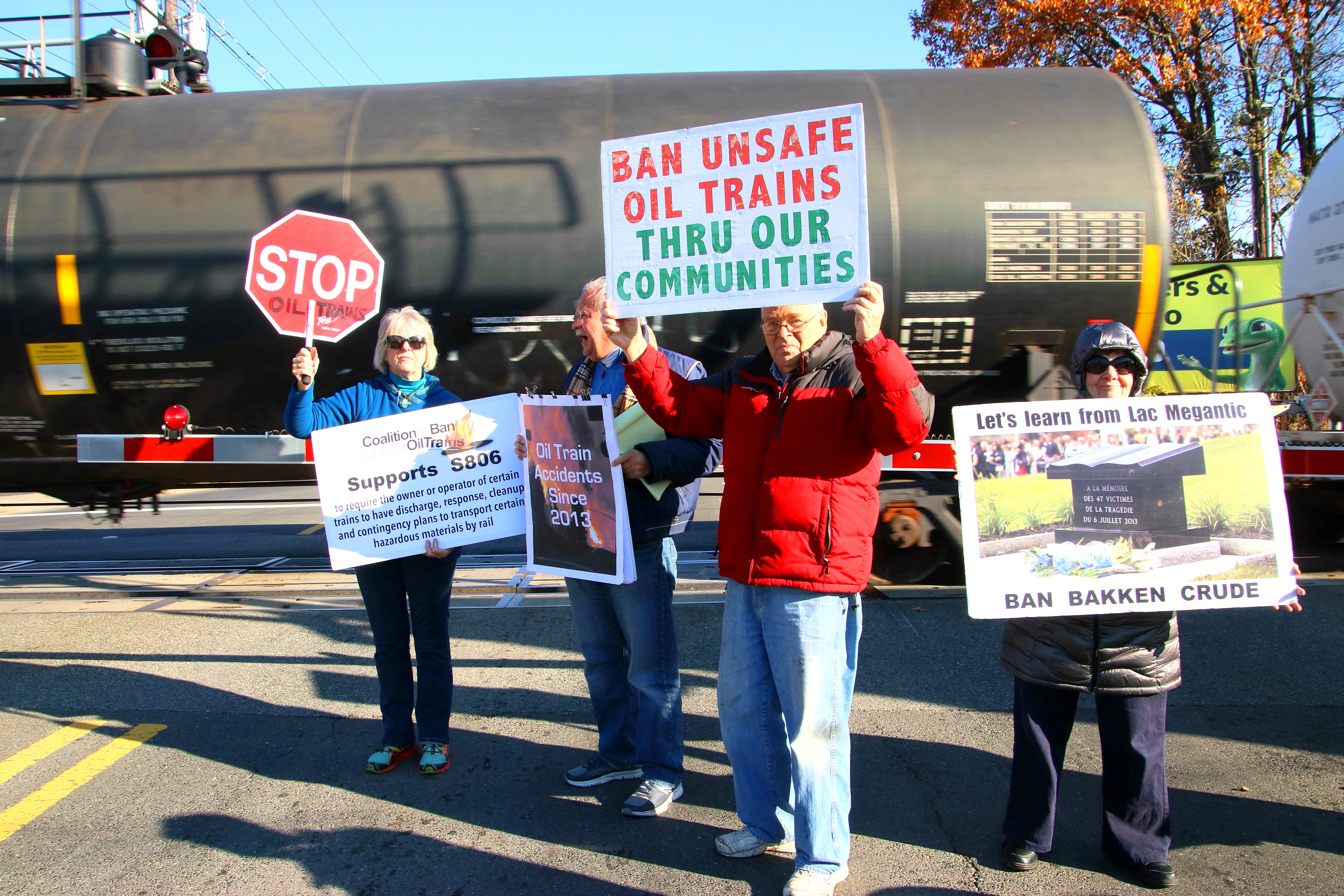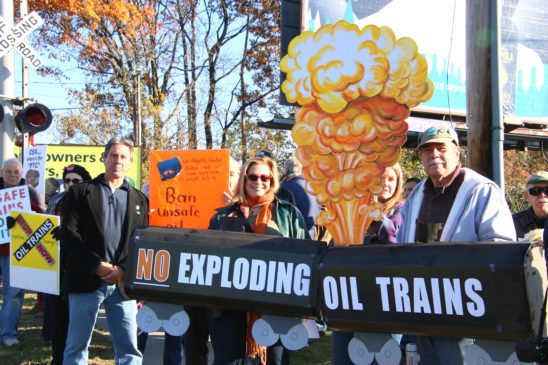
BY MICHAEL OLOHAN
OF NORTHERN VALLEY PRESS
NORTHERN VALLEY, N.J. –– Upset about millions of gallons of potentially explosive Bakken crude oil being transported weekly over CSX rail lines through their neighborhoods – without any notice or information on the trains available to local first-responders – several dozen protesters rallied Sunday, Nov. 12 in Bergenfield to bring attention to what they say is an imminent threat.
[slideshow_deploy id=’899′]
Approximately 30 activists marched in front of CSX trains to raise awareness of the need for CSX to share information on the dozens of trains hauling volatile Bakken crude through northeast Bergen County, said Paula Rogovin, co-founder of the Coalition to Ban Unsafe Oil Trains, via phone Nov. 13.
Rogovin said the group was trying to raise public awareness about a bill (S-806; A-2463) calling for more transparency from rail companies that was passed by the Senate and Assembly but conditionally vetoed by Gov. Chris Christie in July.
Christie said then that the public should not have access to train route and volume information because trains are potential terrorist targets.
The bill was supported by environmentalists, unions and firefighters.
Shane Mitchell, a legislative aide to state Sen. Loretta Weinberg, a bill co-sponsor, said Nov. 16 that the senator was “trying to push” the bill for a Senate override vote on Dec. 7 if possible. The bill would also need to be posted in the Assembly and voted on to override Gov. Christie’s veto.
Mitchell said when the bill was introduced in June 2016, resolutions of support were passed by “a number” of county municipalities. He could not name the towns who supported the legislation.
The bill would require rail companies to provide a publicly accessible website that lists routes, cargo, and volumes on a monthly basis, as well as possible consequences of maximum discharges, and a copy of a discharge response, cleanup and contingency plan.

Rogovin said The Record reported Nov. 11 that a federal inspection report from July 2016 found 13 defects on CSX oil train tracks in Bergen County. She said the inspection covered just a 10-mile segment of the CSX river line between Ridgefield Park and Harrington Park.
In July, CSX reported it was sending five to 15 oil trains every week from Albany, N.Y., over a rail line on the New Jersey side of the Hudson River, said the activists. At the rally, Sierra Club Director Jeff Tittel said that CSX track defects and old trestles and infrastructure were “a ticking time bomb.”
The coalition stated that every day without a comprehensive law that requires rail lines like CSX to provide information on cargo being transported risks a rail accident similar to the one that killed 47 people in Lac-Megantic, Quebec in 2013 or a derailment in Galena, Illinois, in 2015, where rail cars burned for days.
CSX trains carrying Bakken crude enter Northvale and pass through Norwood, Harrington Park, Closter, Haworth, Dumont, Bergenfield, Teaneck (near the Englewood border), Bogota, Ridgefield Park and Ridgefield.
CSX spokesman Rob Doolittle told Northern Valley Press via email Nov. 16 that CSX operates 30 miles of track in Bergen County, and approximately 15 miles through 11 towns traversed by CSX crude oil shipments.
He said safety is CSX’s “highest priority” for employees and residents of Bergen County.
“CSX provides emergency planning assistance and training to local fire, police and emergency response personnel, as well as specific information about the types of materials we transport through a given jurisdiction and appropriate emergency-response techniques for incidents involving the railroad,” emailed Doolittle.
[slideshow_deploy id=’899′]
His email included a press release from July 2015 that promoted a training simulation exercise for local first-responders held at Bergen County Technical School in Paramus “to assess railroad-incident response capabilities, plans, policies and procedures.”
Last summer, CSX was sending 15-30 oil trains monthly but recently reported that they were averaging 5-15 monthly trains transporting crude oil through Bergen County.
In June 2016, when S-806 was introduced by Sen. Loretta Weinberg and co-sponsors – to increase transparency by rail lines about hazardous cargoes – it was supported by scores of environmental groups, International Brotherhood of Teamsters, and a firefighters union.
Dominic Marino, president of Professional Firefighters Association of New Jersey said then: “The safety of citizens and first responders must be paramount when any type of hazardous material is being transported. Knowing the correct information is the only way first responders can properly plan for an emergency.”
Reached Nov. 15, Norwood Mayor James Barsa said that his community was “very concerned about what travels through here” and was in favor of more transparency.
He could not recall whether Norwood had passed a resolution expressing opposition to oil trains carrying volatile cargo such as Bakken crude oil.
